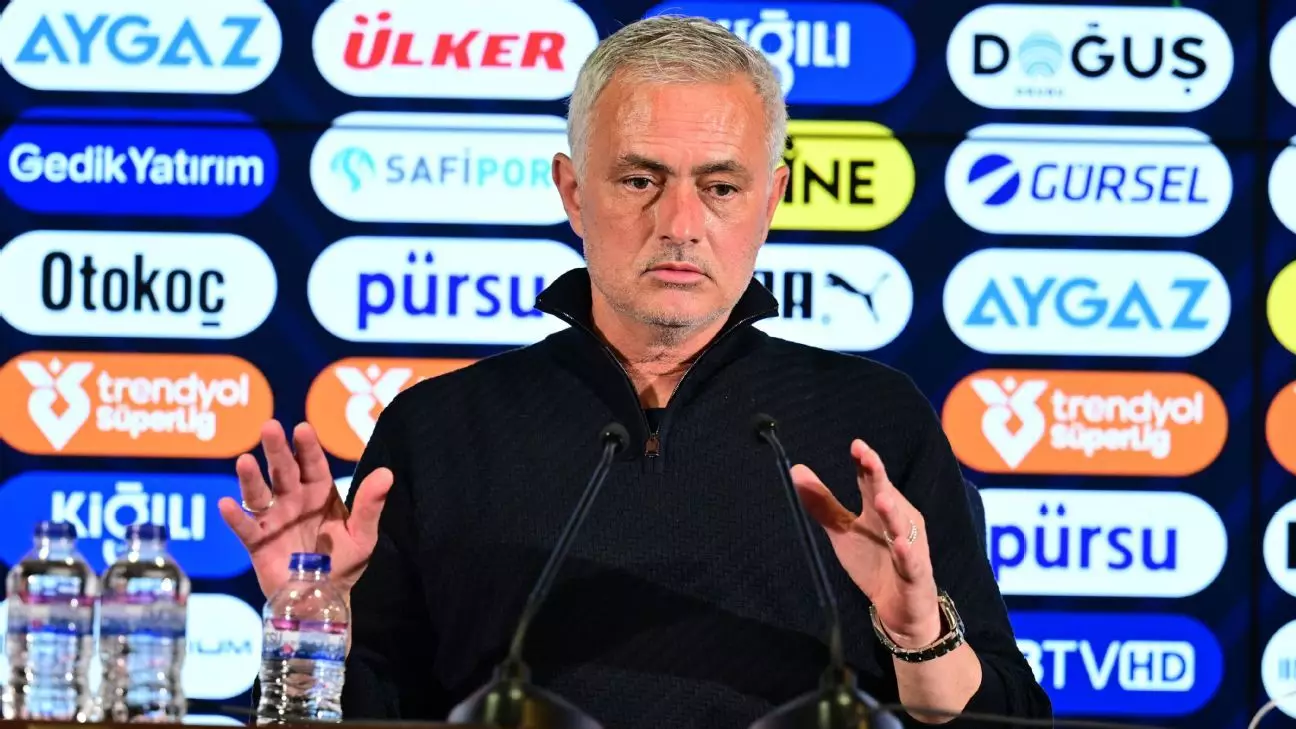Fenerbahce’s aspirations for the Super Lig title have been abruptly hampered by a sense of disillusionment following a disappointing 1-0 defeat against Istanbul rivals Besiktas. This loss marks yet another Derby disappointment for coach José Mourinho, a figure renowned for his tactical brilliance but also for the elevated expectations he brings wherever he goes. The defeat left Fenerbahce languishing in second place, trailing Galatasaray by a daunting eight points with only four matches left to play. The club’s ambitions of clinching their first league title in ten years seem increasingly elusive, leading to uncomfortable questions about Mourinho’s future with the team.
Mourinho, under contract for two years, has been an enigmatic presence in Turkey. His post-match comments reveal a man grappling with both the pressures of expectation and the nuances of the media landscape. “I’m not speaking about next season,” he declared, emphasizing a desire to keep internal matters within the confines of the club. This speaks to his respect for President Ali Koç and the board, but it also raises eyebrows about his perceived detachment from a fanbase desperate for clarity in tumultuous times.
The “Toxic” Environment: Mourinho’s Struggle Against a System
A recurring theme in Mourinho’s statements has been his critique of the refereeing and competitive dynamics within the Turkish league, which he has labeled as “toxic.” His insistence that Fenerbahce’s rivals enjoy preferential treatment highlights a deep-rooted issue that extends beyond tactical blunders. He argues that these systemic disadvantages create an overwhelming psychological burden for his players, making it difficult for them to perform to their potential. “One of the problems that Fenerbahce has is exactly the difficulty to cope mentally with the power of the system,” he noted, suggesting that the challenge is not just about footballing skill but also about fortitude and resilience against perceived injustices.
This perspective paints an illuminating picture of Mourinho’s tenure in Turkey: it is not merely about winning or losing but about confronting an environment where the odds seem stacked against his team. As a manager with vast experience in international football, he shoulders this challenge with a dual strategy—motivating his players while confronting a system he regards as deeply flawed.
Game Management: Navigating Internal and External Pressures
In the wake of a series of disappointing results, criticism from the fans is inevitable, and Mourinho acknowledges this reality. “It’s normal in this culture when results are not the results that people expect for there to be reactions,” he reflects, indicating a level of understanding about the passionate nature of Turkish football. Such self-awareness is crucial, as it shows a recognition of the club’s rich history and the passionate desire of its supporters to see success.
Moreover, Mourinho’s recent comments regarding Ole Gunnar Solskjær, now managing Besiktas, reveal a dual-layered relationship between the two coaches—rivals in the league but colleagues in the broader sphere of football. His refusal to offer unsolicited advice, recognizing Solskjær’s competence, showcases Mourinho’s capacity to reflect on his own experiences while acknowledging the shared struggle of navigating a high-stakes environment. This camaraderie is refreshing amid the intensity of rivalry, and it allows Mourinho to focus on mentoring his own players rather than throwing unsolicited criticism at counterparts.
Looking Ahead: The Path of Resilience
The remaining matches in the league will be crucial—not merely for determining where Fenerbahce finishes but also for how the team responds to adversity. Mourinho is visible in his commitment to foster an environment where both players and fans can overcome collective disappointment. While the title may be slipping away, it is imperative for Mourinho to harness this challenging period as a pivotal moment of growth.
The ultimate test here will be how Fenerbahce withstands the relentless pressures of expectations, both internal and external. By fostering resilience, addressing tactical shortcomings, and unearthing inner strength among his players, Mourinho has the potential to navigate through this tempestuous period. As football aficionados observe this unpredictable league, all eyes will be on whether Fenerbahce can transform the narrative of their season from despair to a rebuilding journey—a testament to the resilience encapsulated in Mourinho’s managerial philosophy.

